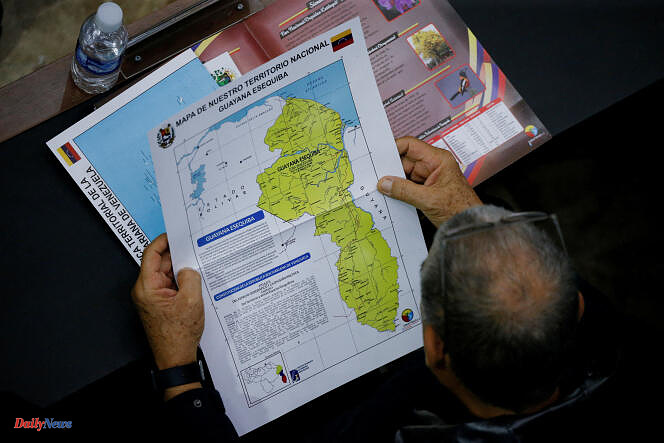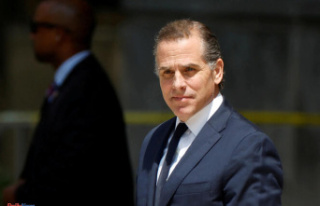The increase in tensions between Venezuela and Guyana over the Essequibo, an oil-rich territory disputed between the two countries, is mobilizing the international community, to the point that, requested by Guyana, the United Nations Security Council united will look into the subject on Friday, December 8, behind closed doors.
Since the discovery of significant oil reserves by the American company ExxonMobil in 2015 and calls for tenders from Guyana for exploitation in the area, the dispute has continued to grow. The referendum organized on Sunday in Venezuela on the fate of this 160,000 km2 area under Guyanese administration and claimed for decades by Caracas acted as an accelerator. According to official figures - contested by many observers - some 10.4 million Venezuelan voters participated in the consultation and 95% of them said they were in favor of the integration of Essequibo into the country.
The members of Mercosur (Brazil, Argentina, Paraguay, Uruguay) as well as Chile, Colombia, Ecuador and Peru, urged in a joint statement Thursday evening "the two parties to dialogue and search for a solution peaceful (…) in order to avoid unilateral initiatives which could worsen the situation. Brazilian President Luiz Inacio Lula da Silva earlier said he did not want a “war in South America.” The British Foreign Minister, David Cameron, called on Caracas to “cease” its actions, “seeing no argument” which could justify “unilateral action”.
US “unwavering support” for Guyana
The United States announced on Thursday that it would carry out “routine” military air exercises in Guyana, a small country destined to become an Eldorado of black gold with the largest per capita reserves on the planet.
“I would be careful not to establish too close a link between routine military operations in the region and this particular issue” of the crisis between the two countries, said Thursday the spokesperson for the American National Security Council, John Kirby . “We recognize the sovereign territory of Guyana and, as we do with many nations, we will conduct operations and exercises as necessary,” he said. He refused to comment on a possible American military intervention. Earlier, US Secretary of State Antony Blinken affirmed his “unwavering support for Guyana’s sovereignty”.
For Venezuela, these military exercises are an “unfortunate provocation by the United States in favor of the praetorians of ExxonMobil”, the main oil operator in Guyana. “They will not make us turn away from our future actions for the recovery of the Essequibo,” insisted Venezuelan Defense Minister Vladimir Padrino Lopez.
“Direct threat” to Guyana
Adding to the tension, five of the seven soldiers from a Guyanese helicopter missing since Wednesday died in a crash about fifty kilometers from the Venezuelan border, announced the army, which reported “two survivors”. The army, which the day before had indicated that it had “no information suggesting” a Venezuelan intervention, opened an “investigation”. However, she specified that the weather conditions were “bad”.
President Irfaan Ali responded by calling it “a direct threat to the territorial integrity, sovereignty and political independence of Guyana.” He stressed that his army was on “full alert” and accused Venezuela of being an “outlaw nation” and “a significant risk to peace and security.” Caracas in return accused the Guyanese president of having “irresponsibly” given the “green light” to the installation of American military bases in Essequibo.
At the same time, Venezuelan President Nicolas Maduro called for the creation of a special military zone near the border and ordered state giant PDVSA to grant oil exploitation licenses in the Essequibo. He also proposed banning Venezuela from oil companies operating in the Essequibo with concessions granted by Guyana.
Acerbic exchanges
The two countries, however, renewed contact on Wednesday between their foreign ministers and “agreed to keep communication channels open,” according to a Venezuelan statement.
However, the exchanges continue to be bitter. On Thursday, Guyanese Vice-President Bharrat Jagdeo said his country did not “trust” Mr. Maduro, at the head of an “unpredictable government” according to him. He also brushed off Maduro’s “ultimatum” to companies operating in Guyana: “They must not heed Maduro or his ultimatum. They operate legally, completely legally.”
Some 125,000 people, or a fifth of the country's population, live in the region, which represents two-thirds of Guyana's land area. Venezuela maintains that the Essequibo River should be the natural border, as in 1777 during the time of the Spanish Empire. Guyana, for its part, argues that the border dates from the English colonial era and was ratified in 1899 by an arbitration court created ex nihilo for the case in Paris.












